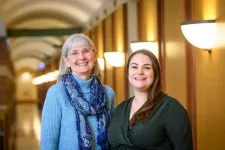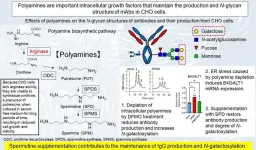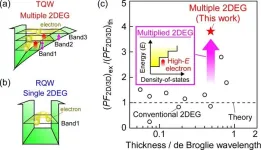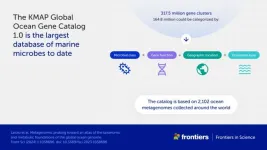(Press-News.org) TORONTO (16 January 2024) – As part of its pioneering approach to drug discovery, the Canadian nonprofit Conscience announced today that its first open science competition has resulted in the identification of seven promising molecules, or “hits,” that show potential for new, more effective drugs for familial Parkinson’s disease.
This first competition in Conscience’s CACHE (Critical Assessment of Computational Hit-Finding Experiments) Challenge series was funded by The Michael J. Fox Foundation for Parkinson’s Research (MJFF).
Six of the winning molecules were submitted by university laboratories and one from a pharmaceutical company. Specifically, the submissions were from the laboratories of David Koes at the University of Pittsburgh; Olexander Isayev (Carnegie Mellon University) and Artem Cherkasov (University of British Columbia); Christina Schindler and Lukas Friedrich at Merck KGaA; Dmitri Kireev at the University of Missouri; Didier Rognan at the Université Strasbourg; Pavel Polishchuk at Palacky University; and Christoph Gorgulla at Harvard University.
“Today’s results are a win for open science, for collaboration in drug discovery, as opposed to a patent-driven approach where scientists work in isolation from competing laboratories,” said Ryan Merkley, CEO of Conscience. “We can also celebrate the emergence of AI as a promising new tool for drug discovery. That’s what makes these findings – even if preliminary – so exciting.”
Parkinson’s disease, which affects 8.5 million people worldwide and more than 1.1 million in North America, can cause tremor, slowness, stiffness, and walking and balance problems, as well as depression, memory problems and other symptoms. It is a disease that worsens over time, and while current treatments offer symptom relief, they do not halt its advance or offer a cure.
“We celebrate today the scientific achievements of CACHE participants around the world and experimentalists at the Structural Genomics Consortium who together discovered new chemical starting points for drug discovery,” said Dr. Matthieu Schapira, from the Structural Genomics Consortium at the University of Toronto, and lead scientist for the CACHE program. “These compounds have an entirely novel mode of action and may help explore new therapeutic strategies against Parkinson’s disease. My hope is to see a real breakthrough in coming years.”
Along with the announcement of the top six hits, Conscience has now made the entire experimental dataset of the CACHE Challenge available to the public, including the chemical structures of all the molecules tested and associated computational methods.
By comparing dozens of computational methods against the same target protein, the CACHE Challenge provided a consistent benchmark and shed light on the most effective AI-generated, hit-finding algorithms.
“Core to our mission is to accelerate discoveries that lead to meaningful new treatments for people living with Parkinson’s disease,” said Brian Fiske, Co-Chief Scientific Officer at The Michael J. Fox Foundation for Parkinson’s Research. “Working with partners like Conscience and their CACHE Challenge model is one way we have been able to tackle complex biology with innovative solutions.”
The CACHE Challenge’s transparency is intended to allow the entire scientific community to learn from and build upon the findings without the hindrance of patents or proprietary restraints. This promises to improve the efficiency and cost-effectiveness of the drug discovery process, which can typically take years, if not decades.
“The Strategic Innovation Fund and its networks provide major investments in innovative projects that help grow Canada’s economy and generate benefits for the well-being of all Canadians. The application of artificial intelligence within a collaborative open science model is bearing fruit,” said the Honourable François-Philippe Champagne, Canada’s Minister of Innovation, Science and Industry. Canada announced CA $49 million in funding for Conscience in October. “These principles have successfully yielded a promising discovery in the treatment of Parkinson’s Disease, and we applaud Conscience’s commitment to this pioneering approach.”
Two thousand molecules were predicted computationally by twenty-three academic and commercial organizations with expertise in computational chemistry or AI-driven computational algorithms to bind the WDR domain of LRRK2, the most mutated protein in familial Parkinson’s disease. Seven molecules were later validated experimentally in a world-class laboratory at the Structural Genomics Consortium at the University of Toronto. These are the first seven molecules ever reported with this type of bioactivity.
An independent “hit evaluation committee” from industry then critically assessed the experimental data to determine the most convincing results. The process, including a second round of predictions and experimental validations to expand on the learnings from the first round, took two years.
“In an era where new therapies for many diseases have been scarce despite substantial investment, the CACHE Challenge provides an alternative, collaborative model for drug development,” said Conscience’s Ryan.
There are currently four CACHE Challenges underway. Two focus on developing medicines for COVID-19, the third seeks to develop new ways to enhance cancer treatments, the fourth explores MCHR1, which plays a role in obesity.
An inaugural CACHE Symposium will take place in Toronto, Canada, on March 6 and 7, 2024. It will bring together leading experts in the field of computational chemistry and artificial intelligence to share their insights and experiences about collaborating through Open Science and developing AI tools for drug discovery.
###
About Conscience
Conscience is a nonprofit biotech focused on changing the game on drug development, by enabling new discoveries for diseases that have received limited attention from the pharmaceutical industry. Using collaborative approaches and artificial intelligence, it breaks down barriers and inefficiencies imposed on profit-driven models. Powered by a network that includes academics, industry, technologists, and public support, a key initiative is the CACHE Challenge. It empowers scientists worldwide to unlock promising drug targets, accelerating the path to treatments for those who need them most. For more information, visit www.conscience.ca
END
From inside an operating room in Barquisimeto, Venezuela, electrophysiologist Maria Milagros Arends, M.D., threads wires from a pacemaker through the veins and into the heart muscle of a patient.
This pacemaker, which regulates the heartbeat and can be lifesaving, was once in the body of another person. It has been recycled, or “reconditioned”— donated, tested, sterilized and shipped from the United States to the South American country for implantation.
“We have a waiting list of around 300 people who could potentially lose their lives in less than a month,” ...
CHAMPAIGN, Ill. — A new study links increased use of acetaminophen during pregnancy – particularly in the second trimester – to modest but noticeable increases in problems with attention and behavior in 2-, 3- and 4-year-olds. The study adds to a growing body of evidence linking the frequent use of acetaminophen in pregnancy to developmental problems in offspring.
The findings are detailed in the journal Neurotoxicology and Teratology.
The research is part of the Illinois Kids Development Study at the University of Illinois Urbana-Champaign, which explores how environmental ...
Monoclonal antibodies (mAbs) are laboratory-designed proteins that mimic the immune system's antibodies. To date, many therapeutic mAbs belonging to the immunoglobulin G (IgG) class of antibodies, have been approved for the treatment of cancer and autoimmune diseases. Cell lines such as the Chinese hamster ovary (CHO) cells are generally used to produce mAbs. Notably, the production and manufacture of mAbs are regulated by critical quality attributes (CQAs) to ensure their safety and efficacy in treatment.
An important CQA for mAbs is the N-linked glycosylation present at a specific position (Asn297). N-linked glycans consist of N-acetylglucosamine (GlcNAc), mannose (Man), fucose ...
DALLAS, JANUARY 16, 2024 — A patient’s oral health can be an indicator of overall health and well-being. Research shows that chronic gum inflammation may be associated with other chronic diseases including coronary artery disease and diabetes.[1] In addition, certain bacteria that live in the mouth can travel through the bloodstream to other parts of the body, including the heart and lungs. Oral bacteria, including viridans group streptococcal (VGS), can cause infective endocarditis, an infection of the inner ...
PULLMAN, Wash. – While it is well known that cannabis can cause the munchies, researchers have now revealed a mechanism in the brain that promotes appetite in a set of animal studies at Washington State University.
The discovery, detailed in the journal Scientific Reports, could pave the way for refined therapeutics to treat appetite disorders faced by cancer patients as well as anorexia and potentially obesity.
After exposing mice to vaporized cannabis sativa, researchers used calcium imaging technology, which is similar to a brain MRI, to determine how their brain cells responded. They observed that cannabis activated a set of cells in the hypothalamus when the rodents anticipated ...
Osaka, Japan – Imagine stoplights and cars communicating with each other to optimize the flow of traffic. This isn’t science fiction – it’s the Internet of Things (IoT), i.e., objects that sense their surroundings and respond via the internet. As the global population rises and such technologies continue to develop, you might wonder – what will power this digital world of tomorrow?
Wind, solar, yes. Something all around us might not immediately come to mind though – heat. Now, in a study recently published in Nature Communications, a multi-institutional research team including Osaka University has unveiled a ...
The ocean is the world’s largest habitat, yet much of its biodiversity is still unknown. A study published in Frontiers in Science marks a significant breakthrough, reporting the largest and most comprehensive database of marine microbes to date – matched with biological function, location, and habitat type.
“The KMAP Global Ocean Gene Catalog 1.0 is a leap toward understanding the ocean’s full diversity, containing more than 317 million gene groups from marine organisms around ...
Highlights:
Research teams share findings and progress on projects aimed at harnessing digital solutions — including text messaging, smartphone apps, wearable devices and artificial intelligence — to improve health, reduce health care disparities, empower people to better manage their health and wellness and enhance patient/clinician connectivity in a special issue of the Journal of the American Heart Association.
Topics in this issue include:
the effectiveness of an “EyePhone” smartphone application to diagnose ...
In the US, approximately 37.9 million people, or 11.4% of the population, lived below the poverty line in 2022. It has been well demonstrated that poverty negatively affects physical and mental health. For example, people living in poverty run a greater risk of mental illness, heart disease, hypertension, and stroke, and have a higher mortality and lower life expectancy. The mechanisms by which poverty impacts on health outcomes are manifold: for example, people experiencing poverty have reduced access to healthy food, clean water, safe housing, education, and healthcare.
Now, researchers have shown for the first time that the effects of poverty may combine in ...
A new study led by a University of Florida College of Public Health and Health Professions researcher finds that people with chronic inflammation living in poverty have more than double the risk of dying from heart disease and nearly triple the risk of dying from cancer within the next 15 years. The findings are based on data representing 95 million Americans ages 40 and over.
While chronic inflammation and poverty are each known to increase mortality risk, when combined, the two factors appear ...




